When it comes to head games in kayaking I am my own worst enemy. One of the greatest obstacles that I have to deal with is when negative thoughts about my kayaking or even myself come into my head whilst I am on the water. These thoughts have the potential to affect my river time so greatly that two things usually occur. The first is that I stop enjoying myself. The second is that my paddling actually gets worse because of it. My whole motivation for kayaking is because I enjoy it so if something gets in the way of that, it needs to be addressed. I came up with a list of my most frequent negative thoughts and how I dealt with them. I then asked people what negative thoughts they themselves experienced whilst on the water. I was amazed at the response I received to this question. It was clear from the replies I was getting that there were some strong common themes and many of the answers actually matched my own list. So I decided to address three of the most prevalent negative thoughts along with how I have learned to deal with these thoughts whilst kayaking.
1. Holding others back
The idea that your presence on the river is holding your friends back was overwhelmingly the biggest worry that people had. Replies that I received included questions such as ‘why do my friends paddle with me?’ Also the worry that your actions would stop your friends from wanting to paddle with you was very common, such as ‘If I mess up or swim then my friends won’t want to paddle with me anymore’. These were thoughts held by people from a whole range of abilities. For myself these are thoughts I have frequently had on the water. I am lucky enough to be friends with and paddle with some truly exceptional paddlers. Some of my closest paddling friends happen to also be the most naturally talented people that I know in kayaking. I am very aware that it is unrealistic to expect that I will ever attain the same level of skill that these friends have. Reoccurring feelings that I have are that I do not want to hold my friends back and I do not want to let them down by ‘messing up’.
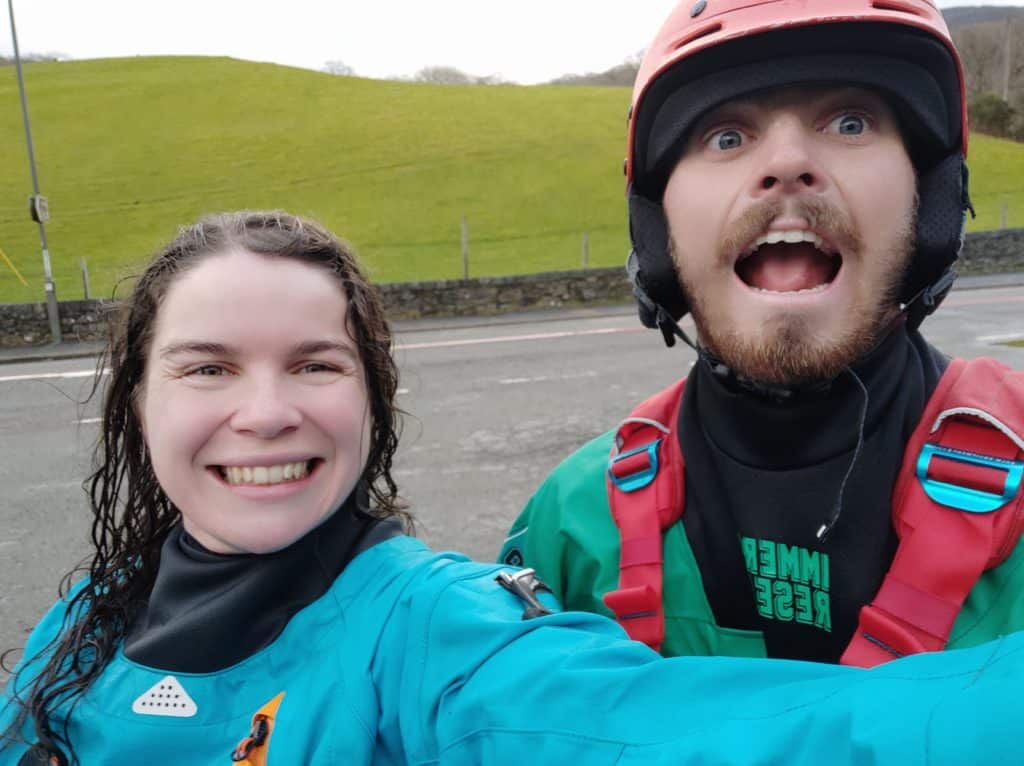
The solution to these thoughts? Remember why it is that you are all paddling in the first place and why it is that you are friends. Chances are that the reason you are with your friends on that river at that moment is because you all want to be. Your friends have CHOSEN to paddle with you. Nobody, no matter how good they are, paddles with people that they do not like. They have chosen to paddle with you because they LIKE YOU and they enjoy your company. Even if there is a huge gap in your abilities compared to your friends, (although that gap is often exaggerated in your head), it does not matter. If your friends wanted to be paddling more challenging water, they would go and do it. But at that moment they have chosen to paddle with you and on that piece of water. If you swim or make a mistake, chances are that it will not affect their desire to paddle with you again. (See my article about swimming if this is a particular worry for you.) So don’t let those thoughts sabotage the fun that you could be having with your friends on that day.
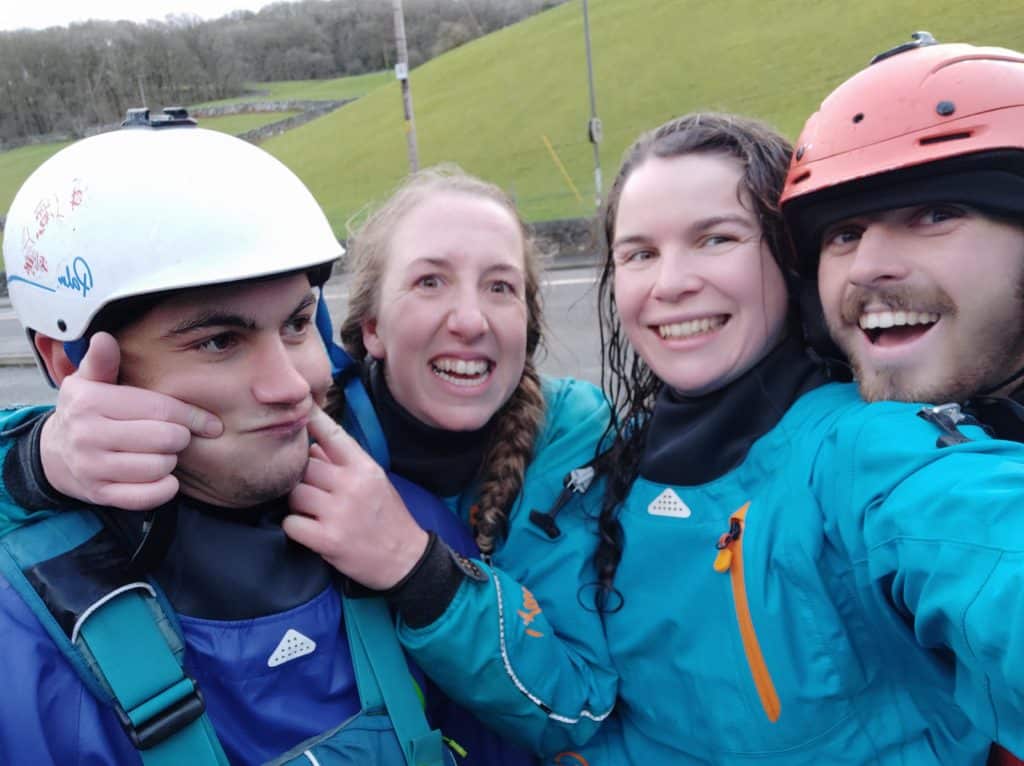
2. Focusing on what could go wrong
On the river we need to stay focused on what we are doing, particularly in times where we are being challenged. However it is easy to become distracted with thoughts of what could go wrong. Examples I was sent included people focusing on swimming, capsizing or ending up in places that they did not want to be. The issue is that if you allow these thoughts to take over then what you are worried about is actually more likely to happen. If you are focused on the fear that you will end up in the hole rather than the actions you should be taking to paddle around the hole, that hesitation or indecision may lead you to end up in the hole. This is the same for every scenario that you could worry about. These negative thoughts have the potential to cause you to self-sabotage your own paddling.
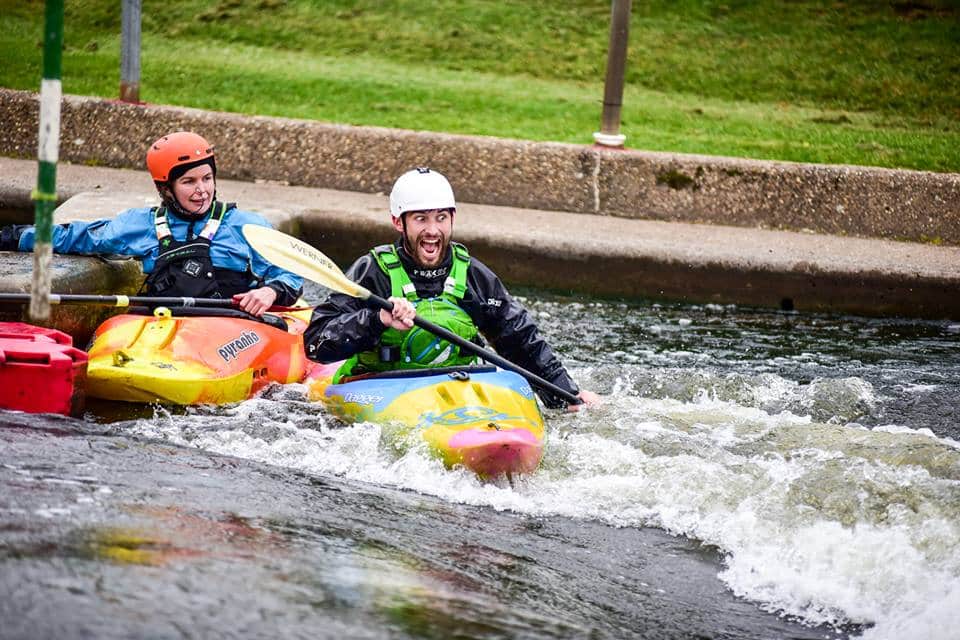
A target for me to help overcome this has been to focus on active positive paddling. When I am kayaking I try to decide on where I want to go and focus on what I need to do in order to get there. For example if I am trying to avoid a hole then I will focus on a line which does that. Whilst I am paddling I am concentrating on that line rather than the hole. Perhaps I am focused on paddling towards the eddy below the hole and therefore my efforts are concentrated on driving the boat into that eddy. What I am not doing is thinking about the hole itself or what would happen if I ended up in there. If I scout something, I like to run it as soon as I have decided on my line. This is partly so that the only thing I am thinking about is the line I am taking and what I need to do to stay on course. It also helps to have an extra few moments to breathe and calm down before committing to my line. The important thing is not to overthink as this can often lead to indecision but instead break out with the only thing on your mind being where you are going.
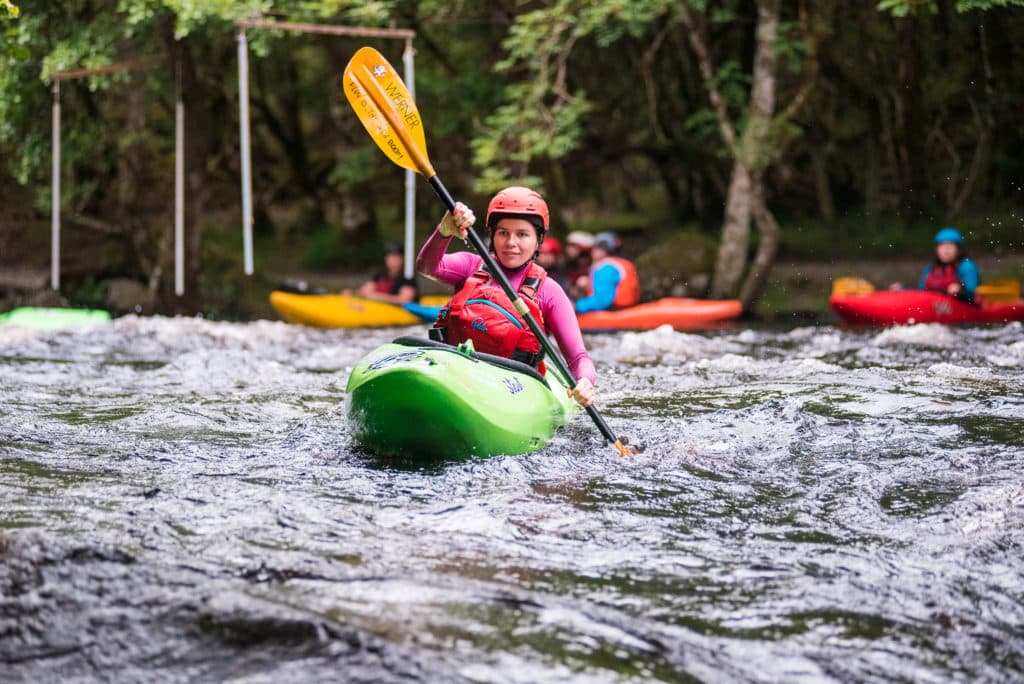
3. I should be better
This is one that definitely seemed to affect paddlers of all abilities, although it was actually mentioned more by highly experienced paddlers than beginners. For myself I find this to be one of the most challenging negative thoughts to overcome. Wanting to improve is no bad thing. It motivates us to put in the hard work and overcome any set backs in order to reach our goals. However this desire to be better becomes an issue when we forget about the goals that we have already achieved. It is accepted that the better you get in any skill, the slower your future progress becomes and many paddlers find that they reach a plateau. Even small improvements can be hard to obtain and this can lead to frustration. Equally once you believe you have mastered a certain skill, it can be upsetting if you then can’t always perform that skill. These thoughts are completely normal but how you then let these thoughts affect you is important.
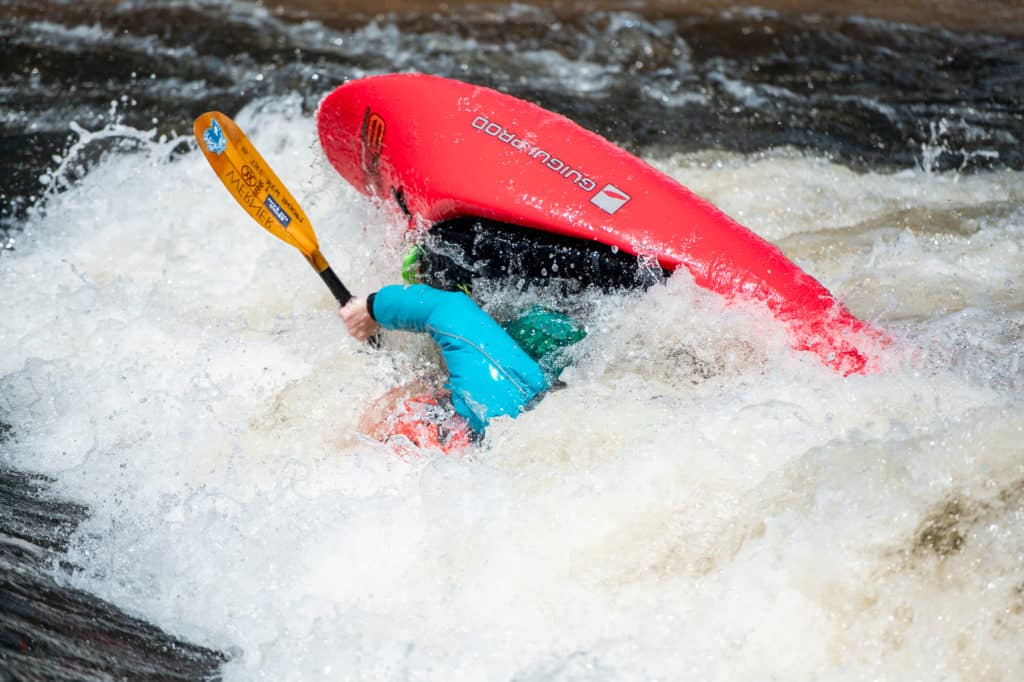
Firstly focus on the progress that you have already made. If I do not paddle a rapid as smoothly as I would like, I try to remind myself that there was a time where I did not think I would ever get to the level needed to even paddle that rapid. When I cannot achieve a tailee every time that I try, I remind myself that there was a time where I could not even cross an eddy line without capsizing. I think back to when I first started kayaking and try to remember how proud that girl would have been of where she is now. It is important to have goals of course but you must remember that all goals take time and need to be chosen carefully.
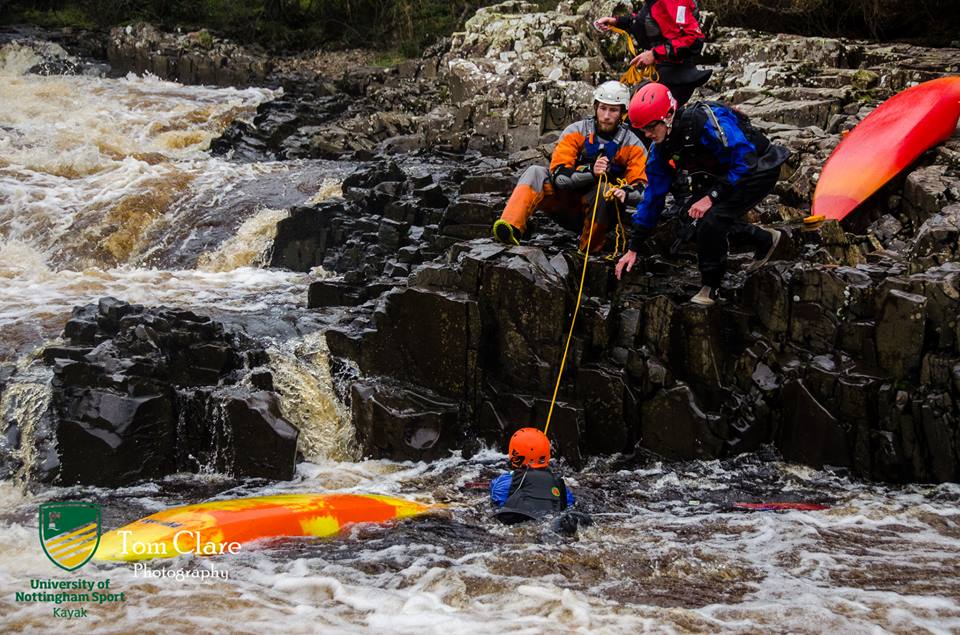
You must also remind yourself of why it is that you kayak in the first place. If you kayak because it is fun, then remove the pressure that you are putting on yourself and just focus on having fun again. If you get to a point where you stop trying because you feel that you should be better, then the only person missing out is you. Everything you have ever achieved you did so in spite of any challenges you may have faced. You kept trying because you wanted to go paddling for whatever the reason was. And reminding yourself of the reasons why you paddle can be a great help. At the end of the day nobody cares how good you are so you shouldn’t either. Just enjoy yourself and you will get better without even noticing.
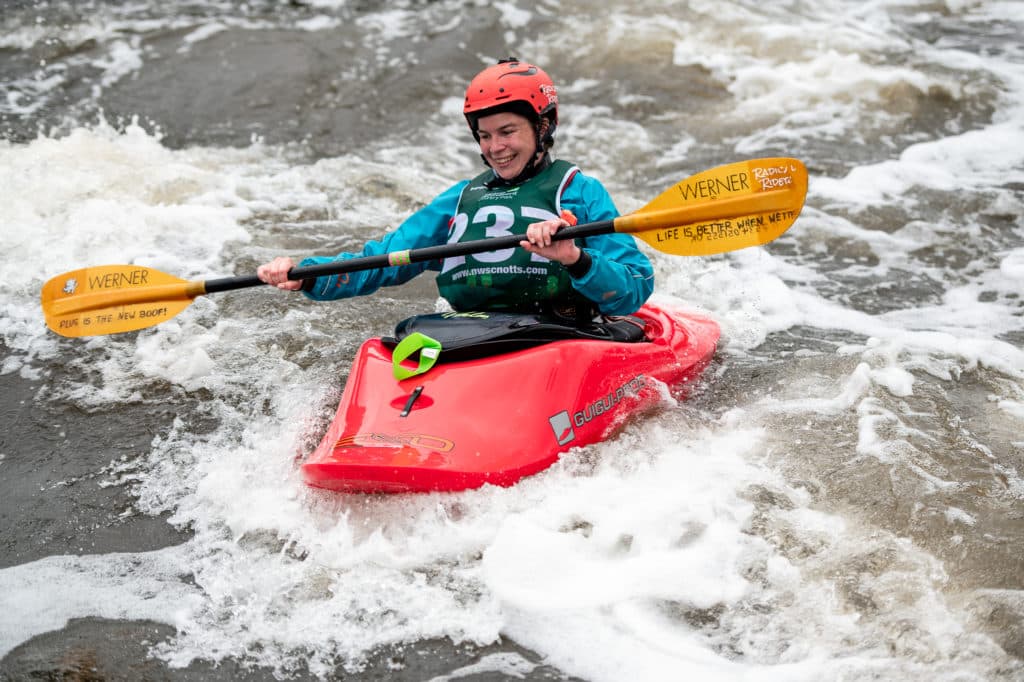
On an end note, having some coaching can give you a massive confidence boost and really help you to deal with any mind game issues. A lot of coaches spend a huge amount of time working on your mindset as well as your physical skills so this may be a path worth investigating! Sometimes just having someone help you to break down your personal worries and address them can really help. I hope if there is one thing you can take away from this article it is that having negative thoughts whilst paddling is a universally experienced problem so please don’t think that it is just you who feels this way!

2 replies on “Negative thoughts and how to combat them”
[…] decided to write an article about negative thoughts because this is an obstacle that I personally have to really focus on to overcome. I am generally a […]
[…] such as ‘I should be better’. I briefly touched on this in my article on ‘negative thoughts‘ last year. This focus on the negative can also be symptomatic of a much bigger issue. […]